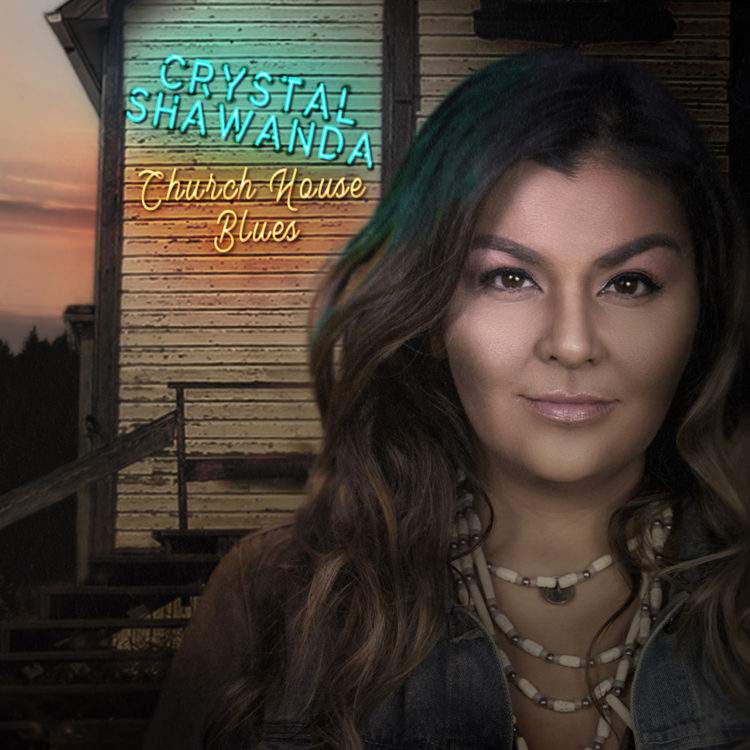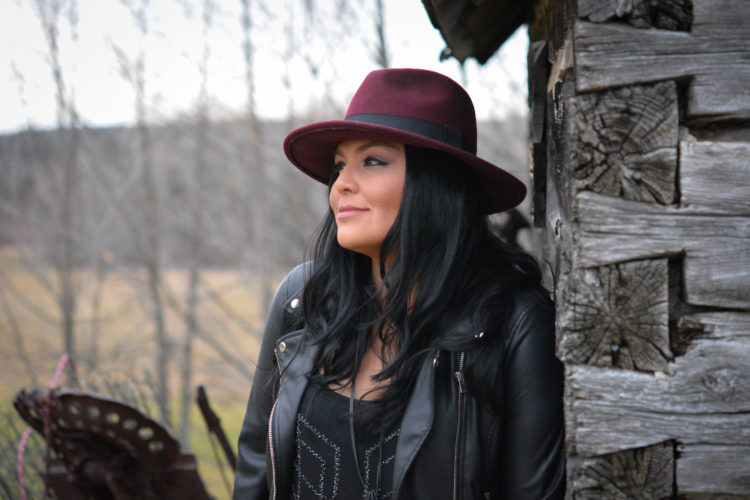
After more than a decade as a rising star on the country music scene and firmly established in her second home of Nashville, Tennessee, Canadian singer/songwriter Crystal Shawanda went thought a big of a crisis of her musical faith. Yes, she had made some hit records performing country music, and was acclaimed as an artist and stage performer.
But tugging at her heart, pleading with her spirit to burst forth from her soul was a deeply imbedded passion, natural acumen and extra-level artistic voice – The Blues. So, in 2014, she recorded and released her first blues album. Two more would follow, including the riveting and raucous Voodoo Woman, which came out in the fall of 2017, just a year after her second blues album, Fish Out of Water.
While a two and a half year gap between albums may seem lengthy and detrimental, considering the times we are currently enduring, the April 17 release of Shawanda’s latest rootsy masterpiece, Church House Blues, is coming at the perfect time. Her powerhouse, soulful, at times hypnotizing, at other times proselytizing vocals are the best tonic for a pandemic and will have you forgetting the crappiness of self-isolation and social distancing with every listen.
It is an exceptional album, filled with emotional and sonic dynamics, anchored by wonderfully compelling songs, and infused with Shawanda’s remarkable energy and a voice that hearkens back to the great women blues singers of times gone by.
Originally, what would come to be Church House Blues was going to be comprised primarily of covers and newer compositions from other writers. But early in the process, Shawanda realized that a change in direction was required – one that unleashed her true potential as a creative artist and infused the album with so much more authenticity and emotional relevance.
“We started work on this album pretty much after the touring cycle for the last album ended. I am always writing, and every idea we have we start building it up before we even have to get ready for a new album. The funny thing is, when we thought we were almost done the album, we recorded a couple of songs that kind of changed the direction and the feel of the album. We just started writing more, and these new ideas were topping the ideas that we already had. By the time we were done, the album was completely different than what we thought it was going to be like a year ago. It was a real evolution and it turned out way better than I hoped,” said Shawanda, who is riding out the Covid-19 dilemma on her home turf, the Wiikwemkoong First Nation on Manitoulin Island in Ontario.

“I really felt I had some momentum, especially from my last record and I wanted to get this album out a year ago. But we knew it wasn’t ready and we knew it wasn’t quite right, so as much as I wanted to keep the momentum going, I had to be honest with myself. I realized, ‘you know, I can do better than this.’ And I didn’t want to worry about the pressure of having to follow up with another one. There are a lot of people who are putting out albums every year, but for me, I just took my time, and when it felt right, it felt right.
“When we started, we were actually planning on recording covers, maybe half or more of the album featuring covers of different songs that influenced us, like I kind of did on the last album. But then we [husband, co-writer, guitarist, producer Dewayne Strobel] wrote some songs. Then we wrote some more songs. And I brought all these ideas to my team; it’s not just me and my producer, we also work with the team at True North Records. We want to hear everybody’s input and everybody’s ideas. When it came down to it, everybody liked the original songs that we wrote and a few of the new songs that had been pitched to me. So, the record turned out as it did. The label said, ‘we love the songs, but yours are really cool, and they’re new and they’re fresh, and it’s showing us a side that we haven’t seen of you before.’ That was a really nice surprise for me.”
Shawanda has writing credits on six of the 10 tracks on Church House Blues, a testament to her growing confidence as a songwriter in general, and as a songwriter in the blues field more specifically.
“I think for my whole life I have battled with trying to prove that I am not just a singer, but I am a songwriter too. I have had some experiences in the past that made me feel bad about myself and wonder, ‘well I don’t know, am I a songwriter?’ The music business can really chip away at your self esteem sometimes. Along the way, maybe I started to lose faith in myself; I started to doubt my abilities,” she admitted.
“Working with True North Records really reaffirmed a lot of things. They gave me a new confidence that I guess I lost somewhere along the way, and I didn’t realize it until they were like, ‘wait a minute, why are we not doing your songs? They’re great!’ So, that was a really big surprise for me, and I was really thankful for that. Because this time I wasn’t trying to fit in, and I wasn’t worried about what other people thought. I don’t want someone to think I am still trying to do country, or that I am too much of this or too much of that. I am at a place in my life where I am fortunate enough and confident enough to say, this is who I am as an artist, and you can take it or leave it, because this is what is coming out of me. This is what I am going through in my life, and whether I wrote the song, or somebody else wrote it, it’s something I can relate to. It’s something I am dealing with or going through or have gone through it in my life. So, I think that’s what was so awesome about this process this time is it was just me being me.
 “Like I said, in the music biz, you can lose yourself trying to please everybody. And that’s what has happened to me a lot in my career, because I am always so thankful for all the people I get to work with, the producers and the songwriters, and the different record labels I worked with through the years. I respect them and admire them – to a fault, to the point where I am trying to be the teacher’s pet or something. I want to do good, not in an ass kissing way, but more that I just appreciate the opportunity and want to live up to it. But, like I said, having a team believe in me and believe in the songs I wrote, it reaffirmed a lot of things, and brought a lot of self esteem and confidence back, because they are believing in my voice and what I am saying and what I believe is important.”
“Like I said, in the music biz, you can lose yourself trying to please everybody. And that’s what has happened to me a lot in my career, because I am always so thankful for all the people I get to work with, the producers and the songwriters, and the different record labels I worked with through the years. I respect them and admire them – to a fault, to the point where I am trying to be the teacher’s pet or something. I want to do good, not in an ass kissing way, but more that I just appreciate the opportunity and want to live up to it. But, like I said, having a team believe in me and believe in the songs I wrote, it reaffirmed a lot of things, and brought a lot of self esteem and confidence back, because they are believing in my voice and what I am saying and what I believe is important.”
And what she increasingly believes is in the power of Blues music to convey a range of emotions, to inhabit elements of the common human experience, and as a true vehicle to leave one’s heart, soul and spirit all on the floor.
“For this album in particular. I didn’t want to chase anything. I wanted it to be very soulful, and I wanted it to be how we are live on stage. And live on stage we have a lot of sass and a lot of attitude and we come from a place of strength when we play and there’s a lot of soul and emotion. But there’s also a lot of fun, and a little flirtatiousness – there’s a little bit of everything, and I wanted that to come out in these songs,” Shawanda explained.
“Some of these songs, like Rather Be Alone, I started writing that for my first blues album [The Whole World’s Got the Blues, released in 2014] and we just never finished it. We kept changing it and we are just finally putting in on this fourth blues album, but that process, like for all the songs, happened naturally. Sometimes a song can be about people that I love. It could be a relative or a friend of mine who was going through that. And sometimes I get so mad, because I am very protective of my loved ones. I can’t really go and beat up their boyfriends, but I can write a song about them. Sometimes that’s how I deal with it, that’s how I protect the people I care about is I write about what they are going through and show them how I see them.
“A song like Rather Be Alone is like that. It is an ode to somebody else and what they have been going through, that this person has finally come around to the point where they realize they would rather be alone that in the relationship. And I have been through that in my past, and it’s a shitty feeling. But the thing about a woman is when she has had enough and she finds that inner strength, a woman is unstoppable.”
The title track is a barn burner of a song, the sees Shawanda displaying her incredibly powerful voice and its emotive range. Co-written alongside David Norris and Lowell Gaines, the song has deep resonance for Shawanda’s life and career, and her lifelong love for music.
“I grew up with different types of influences. My mom used to take me to church to sing, but then also when there was a rock band playing in the bar and grill in the town next door, my parents would take me to go and play there. On Saturday afternoon I would ask the band if I could sit in with them. I would be there and watching people party and get on stage and sing, and then I would go to church and sing the next day and I would also watch the people sing there too. So, it was a real education,” she said.
“I started playing in bars and taverns and roadhouses when I was 12 years old. At one of the places, they would seat me in the kitchen, and I would sit there until it was time to bring me up on stage. When I was done, they would take me back to the kitchen. So, I would see a lot of interesting characters. I was exposed to kind of a wild life at a young age. I wasn’t involved, but I was watching everything go down.
“What I loved about Church House Blues was that it doesn’t focus on the differences of the type of people who go to church and the type of people who go to the bar rooms. It focuses on the similarities. It’s the same type of people; nobody is better than anyone else. We’re all trying to get through this thing alive, and whether you sing in bands and pray it out at church, or you sing in bands and then drink it up at the bar, it’s about whatever gets you ready to face your Monday morning to do it all over again. And I hope that message gets through, whichever one you’re choosing.”
Blame it on the Sugar definitely leads more to the sweet, flirty side of the register, and is a wonderful ode to lasting love.
“The idea actually came from my daughter [now three years old] who was a little baby at the time that I wrote the song. She had this little bib that said, ‘Blame the Sugar’ and I thought that would be a cool song, but I would change it to ‘blame it on the sugar.’ It’s just about when people can’t figure out why a couple works. Maybe it’s just the way that he loves her. That’s what the sugar is – the way that they love you, the way that they give you their heart. And the only one who can understand it is you,” Shawanda said.
Although Shawanda has lived in Nashville for 20 years, she maintains a deep connection to Canada, and especially to her First Nations home community, and also to the music that inspired her as a young woman and young artist – including the legendary and beloved Tragically Hip A perfect addition to Church House Blues is a re-imagined version of the Hip Classic, New Orleans is Sinking, penned by the late, great Gord Downie.
 “It’s part of the soundtrack of my adolescence growing up in Canada. That’s my connection to my home country. Canadians really take pride in our artists. Yeah, we listen to a lot of music that’s from America and a lot of amazing bands from all over the world, but the Hip – they were ours. It’s like an ownership thing. And in that song, he is singing about the South, and that is a place that I was fascinated with and kind of obsessed with. I was always interested in the Southern culture, where the blues came from. And that kind of made me feel more connected to it and to him,” she said.
“It’s part of the soundtrack of my adolescence growing up in Canada. That’s my connection to my home country. Canadians really take pride in our artists. Yeah, we listen to a lot of music that’s from America and a lot of amazing bands from all over the world, but the Hip – they were ours. It’s like an ownership thing. And in that song, he is singing about the South, and that is a place that I was fascinated with and kind of obsessed with. I was always interested in the Southern culture, where the blues came from. And that kind of made me feel more connected to it and to him,” she said.
“When I used to sing this song back in the day, I always used to sing it in a more bluesier way, and I thought it would be so cool if I could record that song and make it more my style. Because nobody can do it like the Hip. If you try to record it like them, it’s just going to sound like a pale imitation, that you’re trying to copy them, and it just won’t work. Each of those musicians, and Gord Downie himself each had their own voice and the way they phrased things, and the way they played music. So, I didn’t want to do that; I wanted something new to be born out of it.”
With little chance of touring for the foreseeable future, Shawanda said she is contemplating various online and live streaming video options to help get the word out about Church House Blues on its release day of April 17.
In the interim, folks can follow Crystal Shawanda on her social media platforms and get the latest info, including future tour dates, at http://crystalshawanda.com.
- Jim Barber is a veteran award-winning journalist and author based in Napanee, ON, who has been writing about music and musicians for 30 years. Besides his journalistic endeavours, he now works as a communications and marketing specialist. Contact him at jimbarberwritingservices@gmail.com.
SHARE THIS POST:
